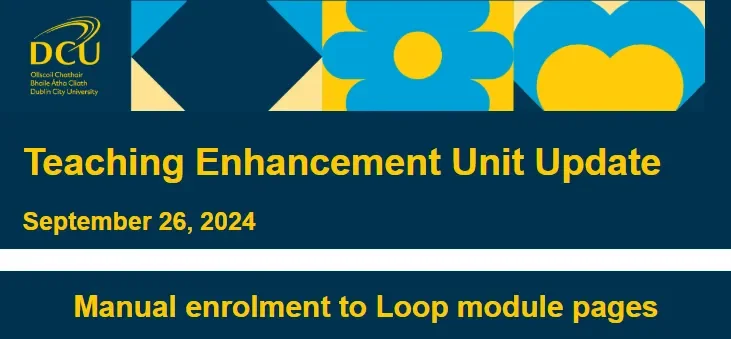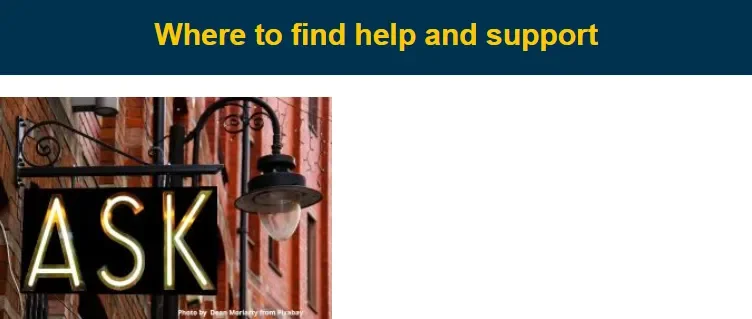
TEU Update September 26 2024

As you are aware, standard practice is for the student information system Banner to enrol students into their Loop module pages once they have successfully registered. We are aware that certain cohorts of students are still to complete their registration and thus do not yet have access to their Loop module pages. Module coordinators may wish to make an exception at this point and manually enrol affected students directly onto their Autumn 2024 module pages so that they can engage with their learning material and activities.
If a module coordinator chooses to do so, here are the instructions to follow. It is vitally important that module coordinators select the correct student to enrol (search and select by their DCU student email address) and that they are enrolling to the correct Autumn 2024 module page, especially where there is more than one CRN for the module. Furthermore, it is vital to underscore to any student who is manually enrolled that just because they have Loop module page access does not mean their registration is complete, and they should ensure they do register fully, and correctly.
Module coordinators or programme chairs may wish to keep a note of affected students who have been manually enrolled so that they can follow up on their registration status later. Please remember of course a student needs a DCU student account to be enrolled into a Loop module page. If they are having issues with their account they can get assistance via help.dcu.ie.

Final call for registrations to our opening day of Teaching & Learning week commencing Monday September 30th. The Full Programme for DCU Teaching & Learning Week 2024 is available with registration links for all sessions.
Registration for online sessions will remain open over the course of the week.
We look forward to seeing you!

Enable collaborative learning with Loop Board
Loop Board is a digital canvas onto which students can post text, links, images or YouTube videos. Students’ posts are anonymous to each other, but not to teachers.
Staff who have used it over the past two years have found it easy to set up and use, and that it helped provide a positive learning environment and give insight into students’ learning and understanding.
It can be used for activities such as:
- Crowdsourcing resources
- Class Q&A
- Exit tickets
- And more!
Watch this video to see how Board works and check out the Loop Staff Support Page for more information.
Interactive learning for students
A dominant way in which students learn is through acquisition (Laurillard, 2002), often via passive learning content such as documents, videos and so on. Learning content which is interactive can be more cognitively engaging for students, as it requires them to pay attention to what they are learning, make choices, manipulate the content or apply their learning through answering questions. As well as being cognitively engaging, interactive learning can also be enjoyable for students.
The H5P tool on Loop is a versatile, easy-to-use tool which allows lecturers to create simple but effective pieces of interactive content quickly and easily. Examples include:
- Interactive videos
- Interactive presentations
- Flashcards
- Timelines
- Branching scenarios
- And more!
Check out this handy one-pager on H5P or visit this resource on the Loop Staff Support Page for more info.
Cybersecurity enhancements
By way of reminder: in early October, the ability for a non-DCU user to create their own Loop account will be disabled. Multi-factor authentication for all non-DCU users will also be introduced. Existing, active non-DCU users will retain their Loop accounts. We hope to work with the Guru Development Unit to establish a process whereby new external examiners will be automatically given non-DCU Loop accounts. Existing external examiners with non-DCU Loop accounts will retain them. We will shortly share details of a new process to request a non-DCU Loop account where a business need exists for such.

Drop-in clinic
The second Loop Reflect online drop-in clinic of the semester will take place as follows:
Wednesday 2 October, 10am-11am
The drop-in clinic is an informal, unstructured space where any student or staff member who has a question about Loop Reflect can come and get guidance. Please circulate the details of this clinic to your students if they are using Loop Reflect this semester.
Setting up Loop Assignments for portfolio submissions
When setting up a Loop Reflect assignment submission in Loop, choose Submission Type ‘Loop Reflect portfolio’ in the settings.
You can choose to lock the submission until after grading to prevent further editing of portfolios once submitted. As soon as you award a grade for a portfolio it will be unlocked and the student will once again have full access to their portfolio in their Loop Reflect account.
Enable text matching if you would like the portfolios to be processed by Ouriginal.

Facilitating collaboration with Zoom Whiteboards
Learning through collaboration (Laurillard, 2002) is a great way to engage students through the co-creation of a shared output. When teaching online, providing active opportunities like this is vital to keeping students engaged.
The Whiteboard feature can be a valuable tool during a Zoom class, enhancing communication and collaboration. They provide a visual medium for sharing ideas, diagrams, and notes, making complex concepts easier to understand. Students can contribute to the whiteboard in real-time, fostering a sense of shared ownership and collaboration.
Whiteboards can be created and used before, during and even after a Zoom class, enabling lengthier collaboration. Learn more in this resource from the Loop Staff Support Page.
Note that if you previously used Google Jamboard for this type of activity you will need to switch to an alternative as Google is deprecating that tool imminently.

|
If you require assistance or guidance with teaching and learning or Loop related matters, avail of the below methods.
|

